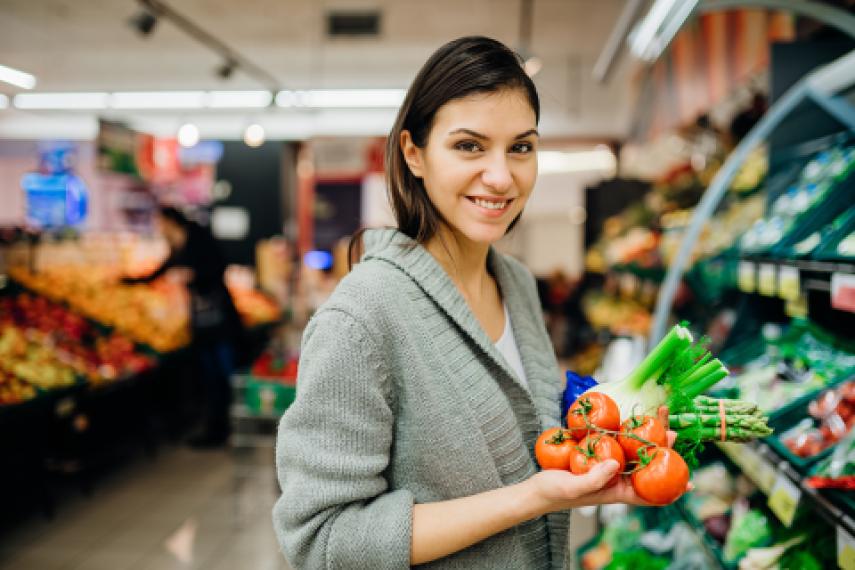
Bringing sustainable living into your life doesn't mean drastically changing your lifestyle or increasing your budget to make more sustainable purchases. Instead, making changes to your lifestyle can be as simple as taking the time to ensure that your grocery purchases are sustainable. In addition, eating sustainable foods can lower your carbon footprint, support ethical food systems, and protect ecosystems.
Moreover, making sustainable food choices doesn't necessarily entail spending more money on food. Instead, there are ways to shop for groceries sustainably while keeping a tight budget. In this article, we will guide you through making sustainable food choices.
Before You Begin
While you may want to jump in and head to your local grocery or health food store, you should take a few small steps at home first.
- Begin by planning your meals and writing a detailed grocery list. Planning your meals will ensure you use all the food you purchase and reduce food waste. Doing this will save you money and make you more sustainable by cutting down on waste.
- Plan big shopping trips. Making frequent trips to the grocery store means using extra gas. Plus, you're probably buying smaller portions and spending more money if you shop daily. Instead, make fewer visits and more extensive trips to the store to reduce gas consumption and buy bulk.
- Bring reusable and perishable bags. Before you leave home, remember to bring along reusable grocery bags. Furthermore, hold onto your perishable bags for produce and other items to minimize waste.
Sustainable Shopping
Making sustainable shopping choices is one of the first and most essential steps to creating sustainable food choices. Here's what to do:
- Transition to eating more plant-based foods. While you can still eat meat if you wish to shop sustainably, even replacing some meat in your diet with plant-based alternatives will help. Plant-based foods have a much smaller impact on the environment than animal products. Plant-based foods consume less water, produce less greenhouse gas, require less land to grow, and pollute the environment less than animal products.
- Pay close attention to packaging. Choose items that have recyclable or biodegradable packaging. In addition, avoid foods that are in styrofoam or plastic. And try to avoid foods that are individually wrapped or packaged, and opt for a bulk item that isn't individually wrapped. For example, rather than buying a box of 20 packets of peanuts, buy a big jug of peanuts instead.
- Buy in bulk. Remember that buying in bulk is an excellent way to reduce the amount of packaging you throw away.
- Choose local and organic foods. Buying locally-sourced foods reduces the energy used to get the food to the grocery store. Also, buying local supports your local community. Try shopping at your local butcher if you're looking for more sustainable meat options. Furthermore, look for organic foods. Organic foods put a smaller burden on the ecosystem and mean that no synthetic pesticides or antibiotics are in the food production.
Reducing Food Waste
Even if you make all these changes to your shopping, you could be doing much better if you're still throwing out a lot of your food. Did you know that the average U.S. household wastes nearly a third of its food? So even if you're sure your household isn't wasting this much, you're still probably wasting more than you think. You could probably do a better job of reducing that number, whatever it is. Try using the following methods:
- Plan your meals. Planning your meals helps you cut down on food waste by ensuring that you don't buy food in excess or purchase food you're not going to eat.
- Don't overbuy perishables. Perishables are an easy food to waste. Sometimes they go bad before we can finish them. Therefore, you should only buy as much as you know you can eat before they go bad.
- Freeze perishables. This ensures they don't go bad before eating them. For example, if you're like many people and you find your spinach always goes bad before you finish it, try freezing half.
- Compost. Composting is a big one. Getting your food waste to 0% is unrealistic; even if you were to cut it down to almost zero, you would still have peels and skins going into the trash. Instead of wasting these and sending them to the landfill, compost them! You can either look into a local composting service or see if your local dump takes food waste to compost. An even better option is starting a compost outside and using the compost to build a garden. Once you have your compost, you can begin being sustainable by turning it into sustainably grown vegetables for yourself!
- Don't recycle packaging with food on it. There are many myths about recycling. One of the main takeaways is throwing away plastic previously containing food. Wrong. If your plastics have food all over them, you either need to wash them and recycle them or throw them in the trash (which is better than improper recycling).
Takeaway
Making sustainable food choices doesn't have to strain your budget. Instead, try planning out your meals and make minor changes to how you think about food. By doing so, you'll significantly improve your sustainable food choices.